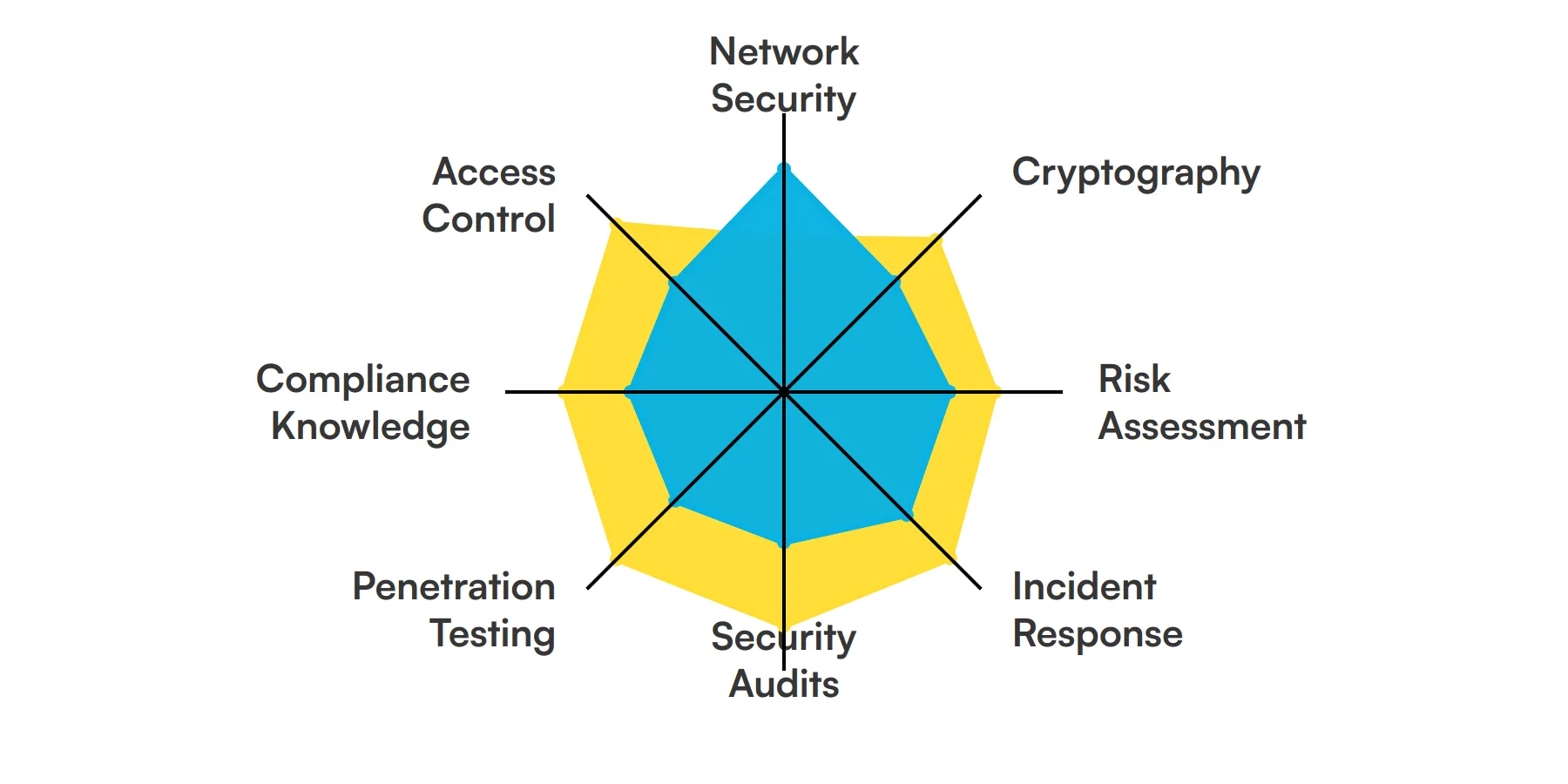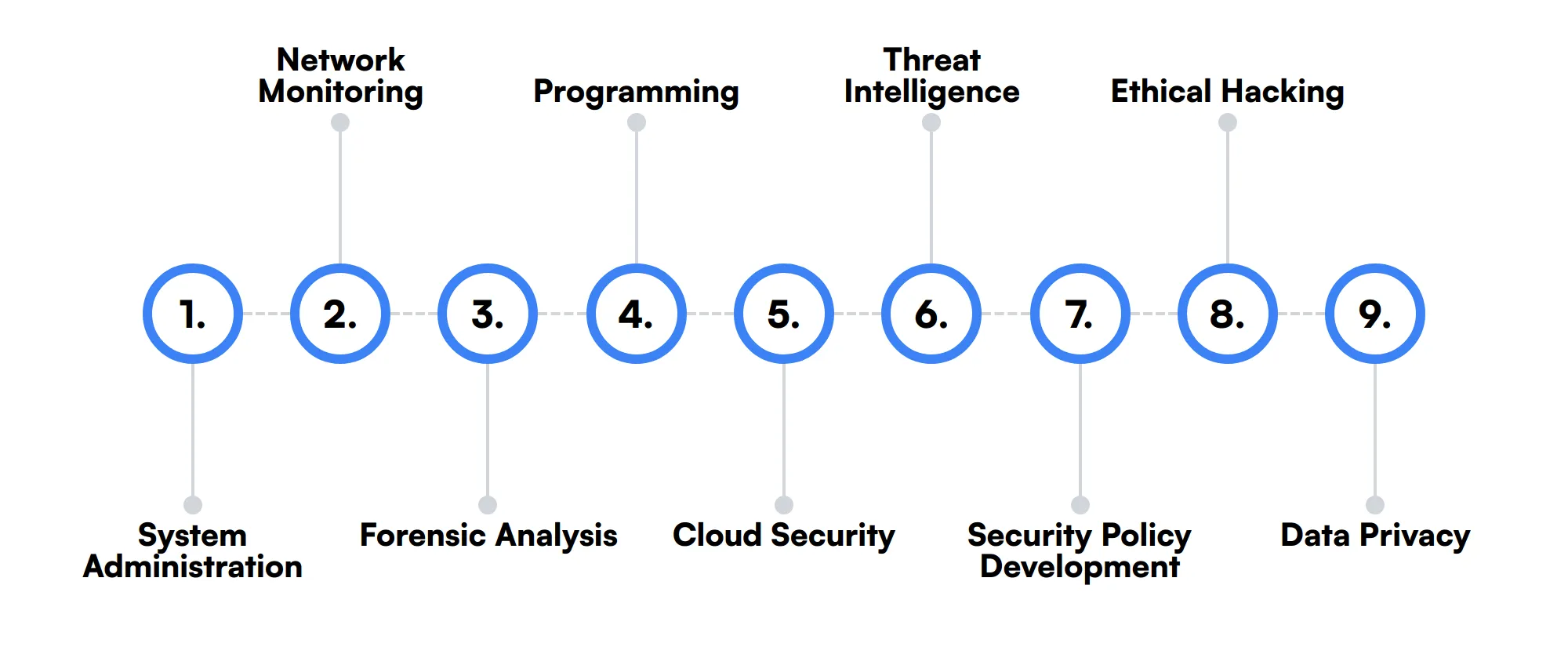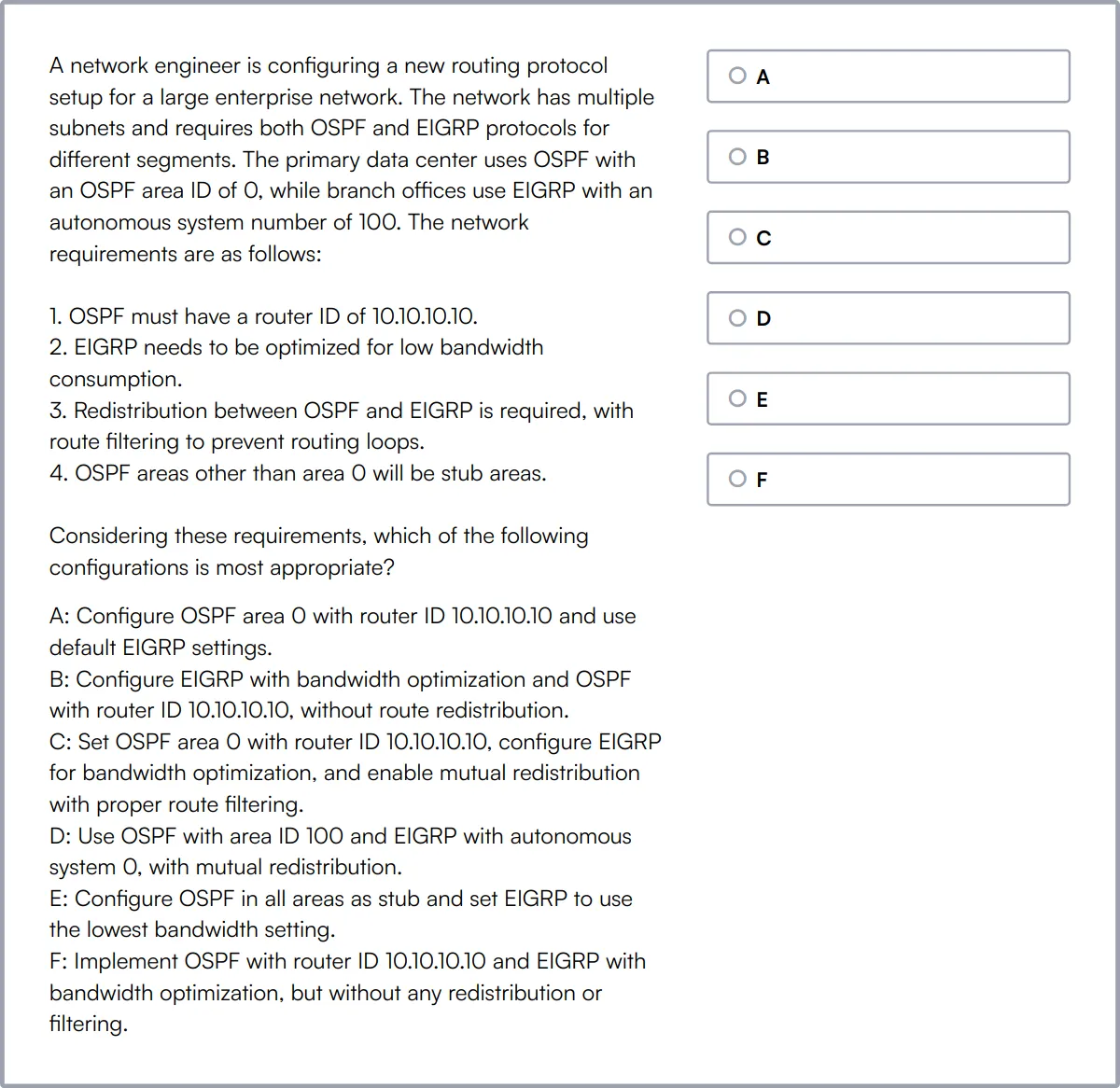System security experts are crucial in safeguarding an organization's digital assets. They ensure the integrity, confidentiality, and availability of information systems.
Skills required for a system security expert include a deep understanding of network security, encryption technologies, and security protocols, along with strong analytical and problem-solving abilities.
Candidates can write these abilities in their resumes, but you can’t verify them without on-the-job System Security Expert skill tests.
In this post, we will explore 8 essential System Security Expert skills, 9 secondary skills and how to assess them so you can make informed hiring decisions.
Table of contents
8 fundamental System Security Expert skills and traits
The best skills for System Security Experts include Network Security, Cryptography, Risk Assessment, Incident Response, Security Audits, Penetration Testing, Compliance Knowledge and Access Control.
Let’s dive into the details by examining the 8 essential skills of a System Security Expert.

Network Security
Network security is fundamental for a system security expert, involving the protection of data flowing through a network. This skill includes deploying firewalls, intrusion detection systems, and encryption protocols to safeguard information from unauthorized access and attacks.
For more insights, check out our guide to writing a Network Engineer Job Description.
Cryptography
Cryptography is used by system security experts to secure communication and protect data integrity. Mastery of cryptographic protocols helps in creating secure systems that prevent data breaches and ensure privacy.
Risk Assessment
Risk assessment allows system security experts to identify, evaluate, and prioritize risks to an organization's infrastructure. This skill is crucial for developing strategies to mitigate potential threats and maintain system integrity.
Incident Response
Incident response is critical for quickly addressing security breaches and vulnerabilities. A system security expert uses this skill to plan and execute strategies to minimize damage and recover from security incidents.
Security Audits
Conducting security audits involves a thorough examination of an organization's security setup. System security experts use this skill to identify vulnerabilities and ensure compliance with security standards.
Check out our guide for a comprehensive list of interview questions.
Penetration Testing
Penetration testing is a proactive approach used by system security experts to identify exploitable vulnerabilities in a system. By simulating attacks, experts can enhance the security measures before an actual threat occurs.
Compliance Knowledge
Understanding compliance requirements is essential for system security experts to ensure that systems adhere to legal and regulatory standards. This skill helps in implementing security measures that meet industry-specific guidelines.
Access Control
Access control is a key skill for system security experts, involving the management of who can view and use resources in an information system. This skill ensures that only authorized users have access to sensitive data.
9 secondary System Security Expert skills and traits
The best skills for System Security Experts include System Administration, Network Monitoring, Forensic Analysis, Programming, Cloud Security, Threat Intelligence, Security Policy Development, Ethical Hacking and Data Privacy.
Let’s dive into the details by examining the 9 secondary skills of a System Security Expert.

System Administration
System administration skills help security experts manage and configure computer systems and software, ensuring they are updated and secure against vulnerabilities.
Network Monitoring
Monitoring networks helps in detecting suspicious activities early. System security experts use network monitoring tools to keep an eye on network traffic and spot anomalies that could indicate security breaches.
Forensic Analysis
Forensic analysis is used by system security experts to investigate and analyze data after a security incident. This skill helps in understanding how a breach occurred and in preventing future incidents.
Programming
Knowledge of programming languages such as Python, Java, or C++ is beneficial for system security experts to automate security tasks and understand the technical nuances of attacks.
Cloud Security
With the rise of cloud computing, understanding cloud security is important for protecting data stored online. System security experts need to be adept at securing cloud environments and services.
Threat Intelligence
Threat intelligence involves understanding and analyzing the landscape of potential threats. This skill helps system security experts stay ahead of emerging threats and adapt security measures accordingly.
Security Policy Development
Developing effective security policies is a secondary skill that helps system security experts establish rules and procedures to protect organizational assets.
Ethical Hacking
Ethical hacking involves the same techniques as malicious hackers but for the purpose of finding and fixing security vulnerabilities. This skill is valuable for system security experts to enhance system defenses.
Data Privacy
Understanding data privacy laws and techniques is crucial for system security experts to protect sensitive information and comply with regulations.
How to assess System Security Expert skills and traits
Assessing the skills and traits of a System Security Expert can be a challenging task, given the wide range of expertise required in areas such as network security, cryptography, risk assessment, and incident response. It's not enough to rely on resumes and certifications alone; you need a comprehensive approach to truly gauge a candidate's capabilities.
Traditional hiring methods often fall short in evaluating the practical skills and real-world problem-solving abilities of candidates. This is where skills-based assessments come into play. By using targeted assessments, you can measure a candidate's proficiency in key areas like security audits, penetration testing, compliance knowledge, and access control.
To streamline this process, consider using Adaface on-the-job skill tests. These assessments can help you achieve a 2x improved quality of hires and an 85% reduction in screening time, ensuring that you find the right fit for your system security needs.
Let’s look at how to assess System Security Expert skills with these 4 talent assessments.
CISCO Security Online Test
Our CISCO Security Online Test evaluates candidates on their knowledge of CISCO network security products and solutions, including firewall, VPN, and intrusion prevention systems.
The test assesses understanding of network security concepts, CISCO IPS/IDS, and the ability to implement security policies and best practices using CISCO security appliances.
Successful candidates demonstrate the ability to design and implement secure network architectures and have a deep understanding of CISCO security solutions.

Cryptography Test
Our Cryptography Test measures a candidate's expertise in cryptography, focusing on algorithms like RSA, digital signatures, and hashing techniques.
This test evaluates the candidate's ability to apply cryptography concepts in network engineering and cyber security, including encoding, decoding, and cyber security fundamentals.
Candidates who score well are proficient in securing digital communications and data integrity.
Penetration Testing Test
The Penetration Testing Test assesses skills in ethical hacking, vulnerability assessment, and web application security.
Candidates are tested on their ability to conduct penetration testing and network security assessments, identifying and exploiting vulnerabilities.
High-scoring individuals are adept at recommending security enhancements and mitigating potential threats to improve system security.
GDPR Online Test
Our GDPR Online Test evaluates understanding of GDPR regulations and data protection best practices.
The test challenges candidates on data privacy, protection, breach protocols, and compliance with data subject rights and consent management.
Candidates excelling in this test are well-prepared to handle data protection responsibilities and ensure GDPR compliance in organizational settings.
Summary: The 8 key System Security Expert skills and how to test for them
| System Security Expert skill | How to assess them |
|---|---|
| 1. Network Security | Evaluate candidate's ability to protect data on networks. |
| 2. Cryptography | Test knowledge of securing information through encryption techniques. |
| 3. Risk Assessment | Assess ability to identify and mitigate potential threats. |
| 4. Incident Response | Judge skills in managing security breaches effectively. |
| 5. Security Audits | Check proficiency in conducting thorough security checks. |
| 6. Penetration Testing | Measure expertise in identifying vulnerabilities in systems. |
| 7. Compliance Knowledge | Verify understanding of relevant legal and regulatory frameworks. |
| 8. Access Control | Assess ability to manage who can view or use resources. |
Elasticsearch Test
System Security Expert skills FAQs
What skills are necessary for a System Security Expert?
A System Security Expert should be proficient in network security, cryptography, risk assessment, incident response, and security audits. Skills in penetration testing, compliance, access control, and system administration are also important.
How can recruiters assess a candidate's ability in network security?
Recruiters can assess a candidate's network security skills by reviewing their experience with firewalls, intrusion detection systems, and secure network architecture. Practical tests or case studies during the interview can also provide insight.
What is the importance of cryptography in a System Security role?
Cryptography helps protect data integrity, confidentiality, and authenticity, making it a key skill for System Security Experts. Candidates should understand encryption algorithms, SSL/TLS, and public key infrastructure.
How does penetration testing contribute to system security?
Penetration testing allows security experts to identify and exploit vulnerabilities in a system before malicious attackers can. This proactive approach helps in strengthening the security posture of the organization.
What should a System Security Expert know about compliance?
Knowledge of relevant legal and regulatory requirements is critical. This includes understanding GDPR, HIPAA, and other industry-specific security standards to ensure that systems are compliant and secure.
Why is incident response critical in system security?
Incident response skills are key to quickly addressing security breaches. A proficient System Security Expert should be able to develop response plans, manage security incidents, and mitigate damage effectively.
How can forensic analysis skills be assessed during recruitment?
Assessing forensic analysis skills can involve presenting candidates with scenarios that require them to demonstrate how they would investigate and draw conclusions from security breaches, using tools like digital forensics software.
What role does threat intelligence play in system security?
Threat intelligence involves understanding and analyzing potential threats to preemptively defend against them. It's important for System Security Experts to stay updated with the latest security trends and threat reports.
Assess and hire the best System Security Experts with Adaface
Assessing and finding the best System Security Expert is quick and easy when you use talent assessments. You can check out our product tour, sign up for our free plan to see talent assessments in action or view the demo here:

40 min skill tests.
No trick questions.
Accurate shortlisting.
We make it easy for you to find the best candidates in your pipeline with a 40 min skills test.
Try for freeRelated posts
Free resources



